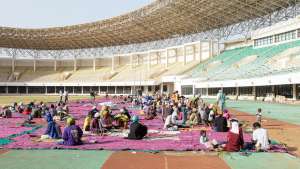According to a 2016 report, a key factor constraining the ability of domestic workers in Bangladesh is “repressive cultural traditions and norms.” The Indian subcontinent's middle-class has indeed been synonymous with enlisting the help of house maids, who were not always guaranteed fair and decent working environments.
Abuse in these contexts has almost become the standard, as one employer points out in the Bangladeshi Daily Star: “Obviously we, the employers, are fearful of losing our 'authority' over our domestic workers, who we consider to be ‘inferior’ to us.”
A sense of “us” vs “them” has been passed down by generations, and prevails.
Having grown up in a middle-class household in Bangladesh, this is something that has preoccupied the thoughts of photographer Jannatul Mawa since childhood. Her photo series, Close Distance, examines the distance between human relations existing in the same space, as is the case with house maids and the families they care for.
The series takes the form of multiple portrait shots of house maids and a woman family member from the family they’re employed by. The way they’re positioned on their respective living room sofas in way that accentuates the distance.
"While maidservants make the bed and dust the sofa day in and day out, they are not expected to sit or lie on them,” she says.
More poignantly, one can sense the discomfort or perhaps strangeness of a house maid sharing a sofa with her employer. This is the very discomfort Mawa wants to uproot through her work.
As a social and gender activist, the issue was close to her heart. “I wanted to do something that represented me, where I came from, what I wanted to do, where I was headed, and at the same time be something that truly came from my heart. Thinking about this took a lot of my time,” she says.
The series is largely inspired her own close relationship with her family’s house maid. But beyond that, she felt a need to "break the ‘spatial’ taboo in urban middle-class homes, which is basically a class taboo”.
Close Distance also highlights interesting views on the distribution of power in the middle-class Bangladeshi household. Mawa adds that she could never understand how money and power determined one person’s control over the other, and she believes this, coupled with vulnerability, further entrenches the distance.
She further points to the layers of power among women themselves. While they’re viewed and treated the same outside of the household regardless of class or caste, this relationship dynamic gives them the chance to exercise power on those less fortunate.
She hopes that the project is viewed not as a personal one, but a larger social malaise that needs to be defeated.
This piece was adapted from an interview by Ria Jaiswal.
More from Design Fabric:
Rajni Perera's embellished photography explores identity alongside surreal dreamworlds
Roshnee Desai is pushing for a research-led approach ot design in India
V Sunil and Mohit Jayal are injecting creativity into India'a public spaces










